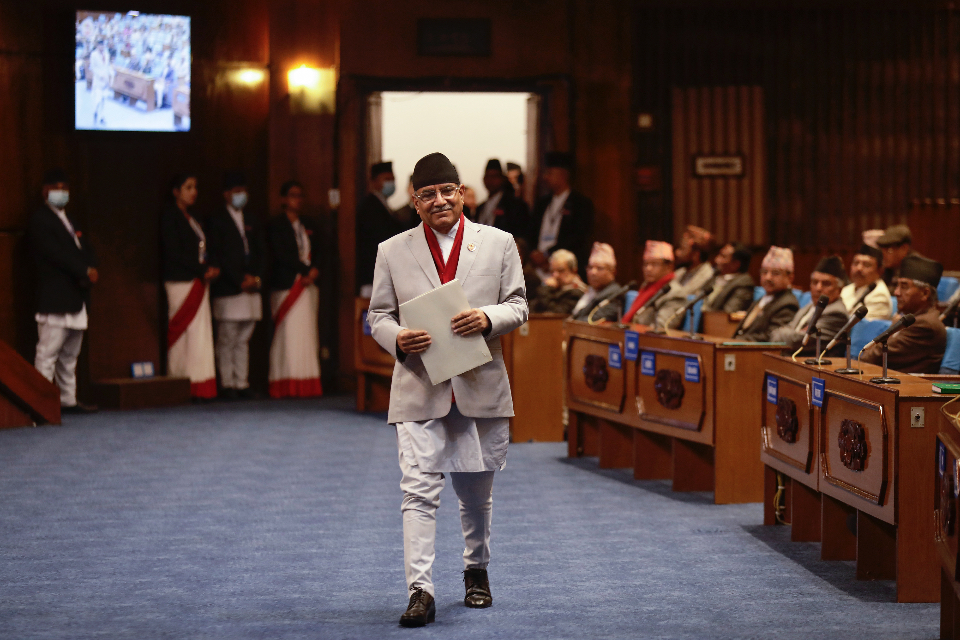Nepal’s illiberal democracy
A government with unconditional backing perpetuates its kleptocracy and kakistocracy.
On 10 January, Nepal’s Prime Minister Pushpa Kamal Dahal received an almost unanimous vote of confidence in Parliament, including from the Nepali Congress (NC), which is the biggest party in the House and is not part of Dahal’s seven-member coalition.
In defence of his decision, Deuba proclaimed that his party had decided to give Dahal vote of confidence to protect the Constitution from the coalition itself -- hinting that he has as coalition partner K P Oli who had dissolved Parliament in 2021 to protect himself. But in doing so, Deuba has made a mockery out of the democratic process, creating a legislature without opposition to hold the government to account.
A national consensus on government formation is expected only in situations of common national interest, such as war or disaster, but clearly personal ambition and partisan interest has taken precedence over the national interest in Nepal.
Prime Minister Dahal dangled the presidency before the NC and top leadership took the bait, obliterating the opposition and endangering democracy. Deuba made it clear he wants to have his cake and eat it too, stating that his party will remain in the opposition but is “open to accepting” positions of President, Vice President, Speaker or Deputy Speaker. Is that all, Mr Deuba?
Even Shekhar Koirala and Gagan Thapa, the leaders of a rival faction within the NC, approved Deuba's platform despite initial criticism. With this, hopes are dashed that NC's 'Young Turks' will ever create an ideological and institutional renaissance within the party.
The NC had an opportunity to be a strong opposition, strengthen its organisation without encumbrance from and obligations to other parties, and re-establish itself as the country’s oldest democratic power. As the party with the strongest mandate in Parliament, it could have used public sympathy for being kept out of power due to political manoeuvring to gain back the trust of the people.
However, Deuba’s refusal to give up his premiership which consequently cost his party the government, and his inability to be an effective opposition has meant that the NC is now worse off in the eyes of the Nepali people.
As it is, people’s trust in the establishment has eroded progressively due to historical political mismanagement and most recently during the Covid-19 pandemic when both the NC and K P Oli’s UML were too busy with their power struggle to much care for public health.
Frustrated Nepalis voted in droves for new, young candidates within former tv anchor Rabi Lamichhane’s Rastriya Swatantra Party (RSP) especially in the urban centres, and for CK Raut’s Janamat in the Tarai and Nagarik Unmukti in the far west. Meanwhile, the general election also saw a re-emergence of the royalist-right Rastriya Prajatantra Party. All of these parties have now become important players in government.
There is still time for the NC to undo the mistake it made by giving the vote of confidence to Dahal. It would do well to remember that Nepali voters trusted the party enough that it is the largest party in Parliament. NC lawmakers can uphold that trust by safeguarding the Constitution and democracy. Instead of being a lapdog of the government, they can be the loyal opposition to make the government accountable.
Analysts have also pointed out the possibility of geopolitical manoeuvring and interference preventing NC from becoming a strong opposition. If this is the case and Nepal’s top political leadership has become pawns of neighbouring nations, our democracy is in an even bigger trouble than we thought.
A government with unconditional backing makes for an extremist kleptocracy that abuses its power and a kakistocracy that exploits citizens and plunders state resources. And even parties that historically fought for democracy, republic and federalism can drift to extremism.
In the absence of a strong opposition, there is a danger that the ruling coalition will call all the shots. This argument has even more basis, given that the government is led by Dahal who is still proud of the 10 years of armed struggle that propelled him to power under a multi-party parliamentary system.
Nepal’s mixed electoral system makes it difficult for any one party to establish a majority. And while abolishing Proportional Representation (PR) elections would be a step towards building a stable government, this will not be possible until political parties ensure inclusivity in choosing election candidates, and Nepal has a diverse Parliament without it being a constitutional requirement.
Until such a time, Nepal will inevitably (and sadly) go through one shaky coalition government after another.
Rabin Giri




